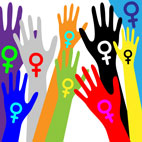
Ombudsman concerned over lack of women in politics
By Tatia Megeneishvili
Friday, July 25
The Public Defender’s Office has expressed its concerns over the declining rate of women's participation in the country’s political life experiences and there is no progress observed on the horizon.
According to Ombudsmen Ucha Nanuashvili, the deterioration in this regard was revealed after the 2014 local elections in which women's representation met only 11.1%. Also, changes were made in the cabinet of ministers without the consideration of female participation.
Nanuashvili stressed that the participation of women in the cabinet has been reduced from 21% to 16%.
“It should be noted that a political system that excludes or does not contribute to the equal participation of genders in the decision-making process cannot be considered as legitimate,” the statement reads.
According to Ombudsman, the usage of potential of women in the state administration is essential for the democratic development of the country.
“It is unfair when 53% of the country's population is female, but their voice in the decision- making process cannot reach even 20%,” the statement reads.
According to the statement, despite the country’s obligations under the international and local documents, active steps to promote the participation of women in political and decision-making processes have not been taken.
“Recent events have once again highlighted the problems and challenges in the field of women's rights. However, the legal mechanisms were not enough to reveal the issue,” the statement reads.
According to the statement, in the Public Defender's 2012 and 2013 reports to Parliament, special attention was paid to the recommendations concerning women’s participation in political life.
“However, unfortunately, recommendations have not been taken into account, and the current situation remains unfavorable in terms of women.”
At the end of statement, the Ombudsman called on the authorities to pay particular attention to the issue of gender mainstreaming in their institutions.
“They should ensure an equal environment for both genders, encourage women’s promotion and advancement in their careers,” Nanuashvili stated, stressing that the development of a temporal mechanism for defeating the current unfair situation is vital for swift change.


